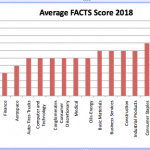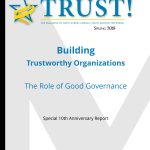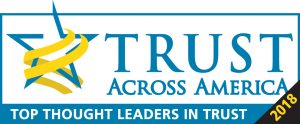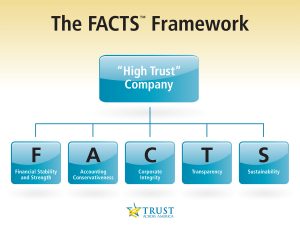Many models of (un)ethical decision making assume that people decide rationally and are in principle able to evaluate their decisions from a moral point of view. However, people might behave unethically without being aware of it. They are ethically blind.
As organizations are comprised of individuals, Ethical Blindness naturally extends into the workplace. Some business sectors appear to be more ethically blind than others, and this creates enormous enterprise risk. This chart shows the trustworthiness of the major sectors for the Russell 1000 companies based on Trust Across America’s FACTS(R) Framework.
Ethical blindness can be corrected if leaders choose to be “tuned in” to the warning signs described below:
- The Board of Directors does not have established long-term policies or procedures in place to elevate ethical and trustworthy behavior with their internal and external stakeholders. For more information see the Spring Issue of Trust Magazine.
- Leaders, unless they are ethically “aware” by nature, are not proactive about elevating trust or ethics as there is no mandate to do so. When a crisis occurs, the “fix” follows a common “external facing” script involving a costly and unnecessary PR campaign. Wells Fargo’s latest “building trust” television commercial provides a timely example. Meanwhile internally, it’s “business as usual.”
- Discussions of short term gains and cost cutting dominate most group meetings. The pressure to perform is intense and the language used is very strong.
- The Legal and Compliance departments are large and growing faster than any other function.
- The organizational culture is a mystery. No clear “ownership” of ethical or trustworthy business practices or decision-making exist. Think “hot potato.”
- Discussions/training on ethics and trust rarely occur and when they do, they are lead by either the compliance or legal department and focus on rules, not ethics and trust.
- Ethical considerations/testing are not part of the hiring process and fear is widespread among employees.
Is Ethical Blindness at the organizational level fixable? Absolutely. But the first order of business requires leadership acknowledgement and commitment to elevating organizational trust and ethics.
These 12 Principles called TAP, were developed over the course of a year by a group of ethics and trust experts who comprise our Trust Alliance. They should serve as a great starting place for not only a discussion but a clear roadmap to eradicating Ethical Blindness. As a recent TAP commenter said:
An environment /culture that operates within this ethos sounds an awesome place to me , I would work there tomorrow if I knew where to look for it.
Barbara Brooks Kimmel is the CEO and Cofounder of Trust Across America-Trust Around the World whose mission is to help organizations build trust. A former consultant to McKinsey and many Fortune 500 CEOs and their firms, Barbara also runs the world’s largest global Trust Alliance, and is the editor of the award winning TRUST INC. book series and TRUST! Magazine. In 2012 she was named one of “25 Women who are Changing the World” by Good Business International, and in 2017 she became a Fellow of the Governance & Accountability Institute. Barbara holds a BA in International Affairs and an MBA. For more information contact barbara@trustacrossamerica.com
Copyright (c) 2018, Next Decade, Inc.









Recent Comments